The Poetry Toolkit: For Readers and WritersISBN: 978-1-4051-9577-5
Paperback
256 pages
March 2012, Wiley-Blackwell
 |
||||||
"The Poetry Toolkit: For Readers And Writers by William Harmon, provides students with the essential intellectual and practical tools to read, understand and write poetry." (Writers Forum, 1 April 2011)
"The Poetry Toolkit is a splendid guide for anyone who wants
to understand better how poetry works, how to read it more
insightfully, and what is involved in writing it.
William Harmon draws on decades of experience both as a professor of literature with a special devotion to teaching poetry and as an accomplished poet who knows the practical side of writing poetry firsthand. From the opening pages onward, he establishes informal, direct, genial contact with his reader, who is equally entertained and instructed.
His wonderfully original Toolkit is a delight to read and the best guide to poetry for writers and readers that I know of."
—Frank J Kearful, University of Bonn, Germany
William Harmon draws on decades of experience both as a professor of literature with a special devotion to teaching poetry and as an accomplished poet who knows the practical side of writing poetry firsthand. From the opening pages onward, he establishes informal, direct, genial contact with his reader, who is equally entertained and instructed.
His wonderfully original Toolkit is a delight to read and the best guide to poetry for writers and readers that I know of."
—Frank J Kearful, University of Bonn, Germany
"In The Poetry Toolkit William Harmon uses a glossary of
literary terms as a cruise ship to take the reader on a voyage of
wonder, discovery, and recognition around the world of poetry. A
poet himself, scholar, teacher, critic, he marshals his seemingly
limitless erudition in discussions of refreshing clarity, with a
relish for language, wry wit, modesty, a willingness to pause and
look again, a willingness to be surprised. He is a peerless tour
guide, with anecdotes you will never forget. And you will never
think of poetry, or think of writing poetry, in quite the same way
again."
—Robert Morgan, Cornell University



